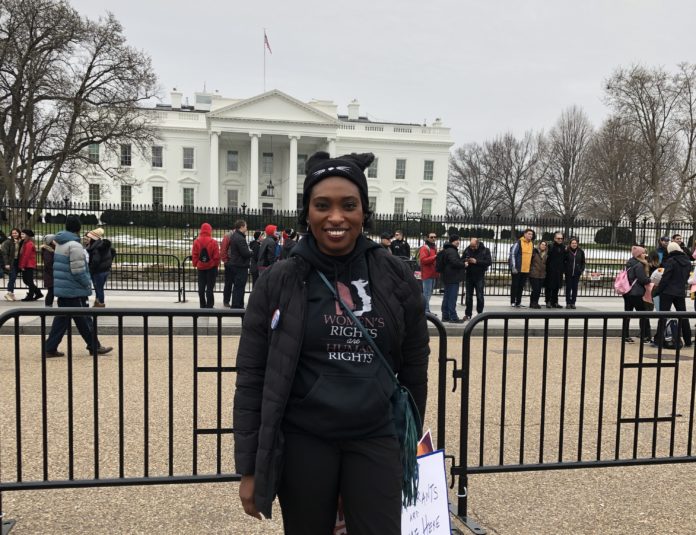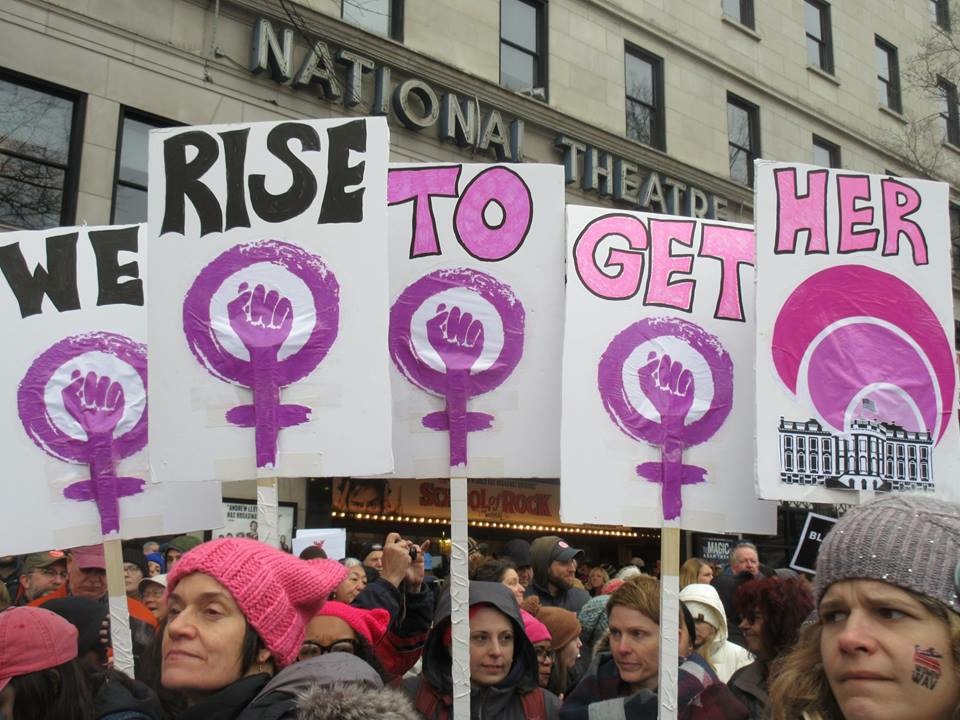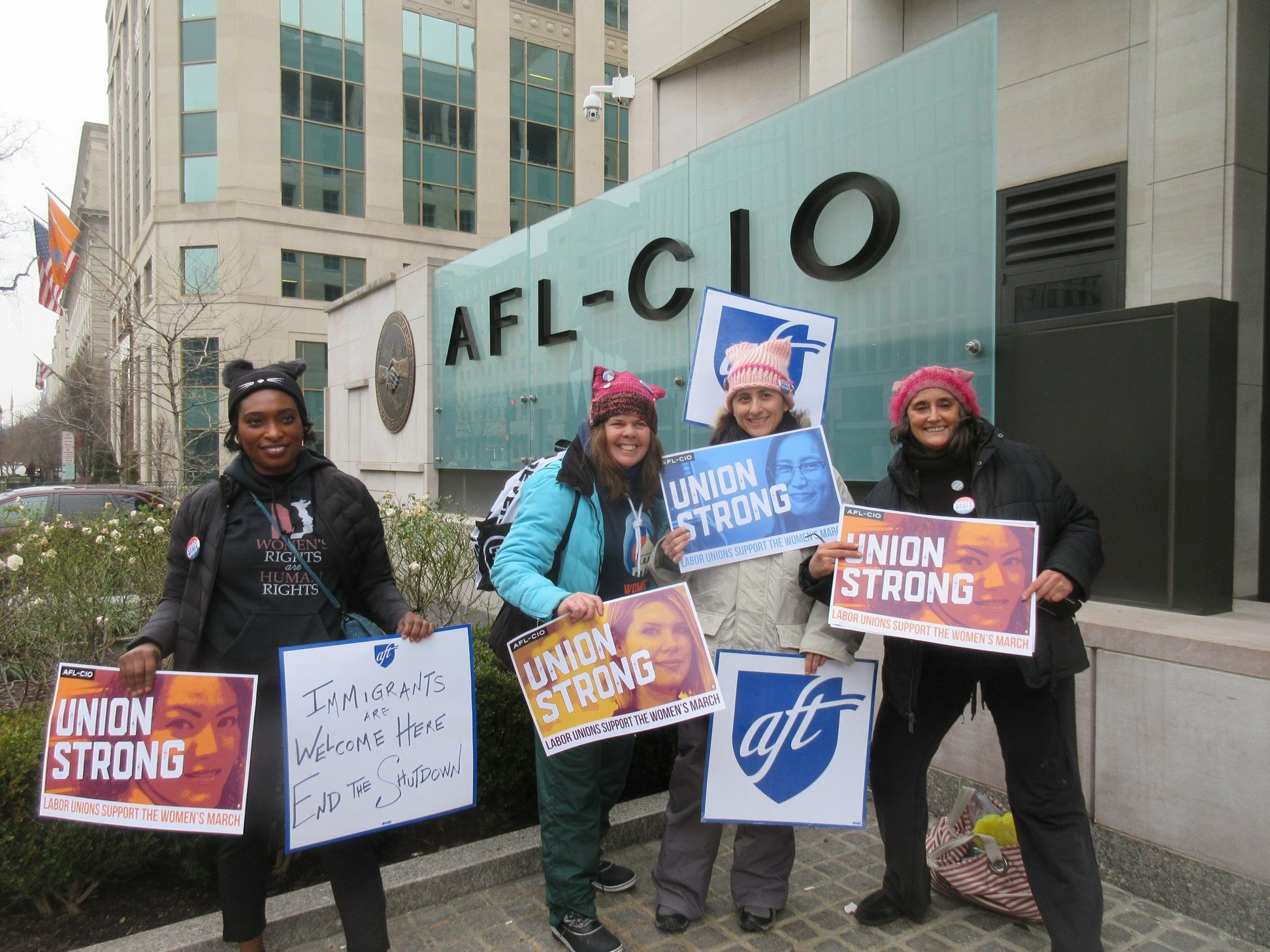
In 2016, I worked in western Michigan, a bastion of Trump support, to get out the vote for Democratic candidates, including Hillary Clinton.
On election night, I was so nervous that I was nauseous and shook uncontrollably. Having spent 11 weeks knocking on doors across America’s rust-belt, I sensed, deep down inside, that Hillary Clinton would not prevail.
After my month of despair, that first Women’s March re-energized me, boosting my activism and turning my anger into action.
After hesitation, I went downstairs to an election-watching party that the local Democratic chair was hosting in my hotel. As I saw the results come in on CNN and looked across the mostly empty room, my body began to shake again. I had to sit down to regain my composure. The American people were not just rejecting that a woman become the U.S. President. People, like those I had canvassed, were rejecting the policies of Hillary Clinton, Bill Clinton, and Barack Obama. They felt that the Democratic party had become too elitist and forgotten them. They decided to take their chances with Trump, hoping he would lift them out of poverty and deport all the immigrants who were stealing their jobs. It was mind-boggling that they would believe anything that Donald Trump said, a man who had filed bankruptcy numerous times, cheated his workers out of their paychecks, established a fraudulent business school, made racist and xenophobic statements, and boasted of being a a serial violator of women. Yet, in their desperation, a portion of the U.S. electorate chose him to be their president. Due to the absurd Electoral College system, Trump won the Oval Office (despite losing the popular vote).

I did not want cry in front others, so I went back to my hotel room and started to sob. I feared the America of a President who had demonized Mexicans, African Americans, and Muslims, insulted disabled people, wanted to outlaw women’s right to an abortion, and opposed environmental laws.
Heartbroken, I returned to my home in New Jersey, where my associates and family urged me to channel my disappointment and anger into fight-back. At a union meeting/Christmas party in December 2016, I was invited to a Women’s March to be held on Jan. 21, 2017, the day after Trump’s inauguration. I immediately accepted.
That first Women’s March was spectacular. Over half a million women and men from across the U.S. descended on the U.S. Capitol to tell Donald Trump that he was unfit to be president. The demonstrators called for protecting reproductive healthcare and women’s and LGBTQ rights, stopping the border wall and discrimination against Muslims, and rejecting Trump’s racist, sexist world-view. The march was peaceful and uplifting, epitomizing women’s support for one another.
It was also so crowded that it was difficult to move around marchers, who included pregnant mothers, parents pushing baby carriages, and people in wheel chairs. Many women wore pussy hats (I ordered one afterwards).
There were thousands of signs, with slogans like “If you are neutral in a situation of injustice, you have chosen the side of the oppressor”, “I will stand with the vulnerable, refugees, blacks, environment”, “Black Lives Matter”, “End voter suppression”, “My body my choice”, “We, the people…”
After my month of despair, that first Women’s March re-energized me, boosting my activism and turning my anger into action.

The 2019 Women’s March last Sat., Jan. 19, in Washington, DC was as important as the 2017 march. It was smaller, but the energy, determination, and solidarity were strong. The demo was again peaceful, and I encountered people from all parts of the country, including Missouri, Georgia, South Carolina, and Wisconsin. Women and men, young and old, the disabled and pregnant, all turned out despite the forecast of rain and snow.
In the months before the march, Tamika Mallory one of the Women’s March founders, came under fire for her association with Minister Louis Farrakhan, the Nation of Islam’s leader. Many of the co-sponsors removed themselves from the Women’s March because Ms. Mallory refused to condemn Farrakhan. I was sad to learn that the NAACP, the oldest U.S. civil rights organization, disassociated from the Women’s March over this issue, as well as the Democratic National Committee (DNC). This is sectarian and divisive, and I would ask Democratic party leaders and elected officials why they don’t refuse to sit down with Republicans or to collaborate on legislation with them unless the GOP denounces President Trump or his Nazi sympathizers.
Immigration is one of the top three issues I care about. I feel I must stand up and protest when Trump pits U.S. citizens against immigrants for his failure to create decent jobs with health benefits and retirement plans. Trump has demonized hard working and tax paying immigrants who have become afraid to go about their daily lives in the place they call home (some having lived here for decades). For example, recently in a Manhattan coffee shop, after an Hispanic woman spoke Spanish to a cashier, a white lawyer threatened to call ICE.
The annual Women’s March of the past three years (I also marched in 2018) has become an important expression of the breadth and depth of the movement opposing Trump and his reactionary policies. Women’s groups can be credited with helping to save the Affordable Healthcare Act (sometimes called ObamaCare) because they pressured elected officials in Congress and town meetings not to repeal this important gain of working people, won after years of struggle.
That struggle must continue to win free healthcare for all, as is found in every other industrialized nation. We must defeat Trump’s racism, xenophobia, militarism, and desecration of the earth and Nature. If we are serious about making Trump a one-term President, we must continue marching, as women (and men) did last weekend.
Marie-Paule Florestal is a teacher, unionist, and leading member of the 1804 Movement for All Immigrants.










